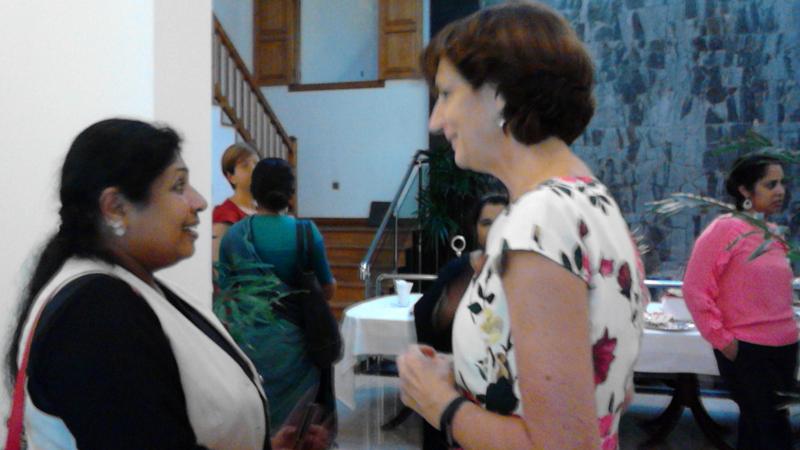
Women still find it difficult to enter the political structure at the provincial and local government levels as there is no mechanism provided by the political parties to choose the right candidate, a group of women contesting at the forthcoming local government elections said. “Lack of such a mechanism will pave the way to bring in unqualified, unsuitable people to the fore just like in the case of male politicians at present.”
 The decision makers - mostly male politicians - at the provincial level, the women claimed, are trying to bring in women candidates on personal grounds, rather than giving the opportunity to qualified people.
The decision makers - mostly male politicians - at the provincial level, the women claimed, are trying to bring in women candidates on personal grounds, rather than giving the opportunity to qualified people.
Chandrika de Soyza of Maharagama and Sabeena Musaffer of Hambantota are two seasoned political leaders at the local government level and have contested and won previous elections. However, they are of the view that the women newcomers with qualifications and suitable attributes find it difficult to make it to the point where they can contest as male politicians who choose candidates are biased.
Interestingly, the two women who are contesting from Batticaloa and Nuwara Eliya said they have been working with ‘male groups’ over the past 10 years.
Alexandrina Sylaja Alexander from Kotagala, Nuwara Eliya said she has been working with the Upcountry People’s Front for the past 10 years and that both men and women have pledged support for her in the forthcoming elections. She also admitted it was not an easy journey for her to come this far as a political leader in the grassroot level.
Sindhuja Maran, a mother of two from Batticaloa said her husband is very supportive and both of them have been able to get support for her candidacy from the men in the area.
These four women contestants from Batticaloa, Hambantota, Maharagama and Nuwara Eliya were in Colombo last week on an invitation by Dutch Ambassador in Colombo Joanne Doornewaard.
The ambassador introduced them to a group of women leaders including leading business women, leaders of women’s organizations, women ambassadors and directors of international institutions last week at her residence.
The meeting took place in the wake of Sri Lankan women getting the new quota of 25 percent to contest for local government elections.
This marks an important opportunity to strengthen women’s political participation in Sri Lanka, where women currently make up just four percent of local government representatives, the lowest of any country in South Asia.
Doornewaard said the intention of the gathering was to bring women together for networking, to learn from each other and to help each other and to support the future women leaders who are likely to run in the upcoming local government election.
The International Foundation for Electoral Systems (IFES), via the “She Leads” campaign, has trained 250 women from Sinhalese, Tamil and Muslim communities on practical skills. In the future the ambassador said the IFES alumni would be offered mentoring opportunity through this network.
The Government gazetted the Provincial Councils Elections (Amendment) Bill to increase the number of female representatives in Provincial Councils. The Bill seeks to amend the Provincial Councils Elections Act, No.2 of 1988. Also, according to the new Act, 25 percent of women’s representation is compulsory for candidate lists.
This makes it binding on all political parties and independent groups to field at least 30 per cent female candidates in Provincial Council elections in the future.
As per the Bill, the returning officers have the authority to reject any nomination paper which does not contain the number of female candidates required to be nominated.
The Bill has been issued by Local Government and Provincial Councils Minister Faiszer Musthapha as a Supplement to the Gazette on July 7 this year.
The Government has taken a policy decision to increase the female representation in all political decision-making bodies.
As the first step, the Government in March last year amended the Local Authorities Election Act to include 25 percent quota for women at the Local Government elections.
An Elections Department official said that female representation in Provincial Councils is about four percent as of now. The female representation in Parliament is about five percent.
According to IFES, the new quota will substantially increase women’s local-level representation, additional efforts are needed to address the persistent gender barriers that continue to inhibit women’s ability to contest for office.
Last year Australia’s Ambassador for Women and Girls, Natasha Stott Despoja, launched an Australian-funded program to enhance women’s participation in local governance in Sri Lanka.
Ambassador Stott Despoja was joined by two women political leaders - Member of Parliament (MP) Sudarshini Fernandopulle and Rosy Senanayake, a former MP. As part of the program, the International Foundation for Electoral Systems (IFES) is working with the Election Commission of Sri Lanka, the Institute for Local Governance, and local partners to implement its “Promoting Women’s Electoral Representation” (POWER) project.
The POWER program seeks to strengthen the implementation of the local-level quota, address persistent gender issues in the media and electoral security sphere, and build momentum for a more gender-positive electoral environment.
Key program activities will include conducting gender-sensitivity trainings for media and political parties, in collaboration with the Election Commission; working with the Institute of Local Governance to train a new cadre of women leaders through a nationwide
“She Leads” Sri Lanka program; implementing a public awareness campaign on the importance of including women as elected leaders; and working with observer groups to address violence against women in elections.
